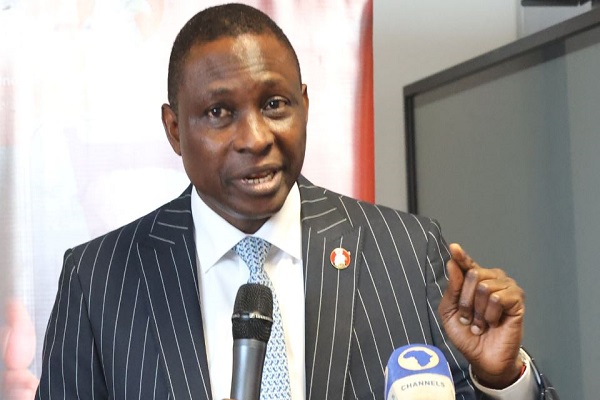The Court of Appeal in Abuja has ordered the stay of proceedings in the contempt charge instituted by Yahaya Bello, former Kogi governor, against Ola Olukoyede, chairman of the Economic and Financial Crimes Commission (EFCC).
A Kogi state high court, presided over by Isa Jamil Abdullahi, had ordered Olukoyede to appear before it on May 13 to show why he should not be committed to prison for allegedly disobeying its order restraining the EFCC from arresting or taking any action against Bello.
However, the EFCC chairman filed an appeal against the court summons.
Olukoyede filed two motions—one seeking a stay of execution of the summons and another one asking to serve processes on Bello via substituted means by pasting the process at his Abuja residence on No. 9 Bengazi Steet Wuse Zone 4.
In its ruling on Friday, a three-member panel of justices led by Joseph Oyewole granted the two motions.
The appellate court fixed May 20 for the hearing of the substantive appeal marked CA/ABJ/CV/413/2024.
BACKGROUND
The former governor also sought an order “restraining the respondent by themselves, their agents, servants, or privies from continuing to harass, threaten to arrest, or detain him.”
On February 9, the Kogi high court granted an interim injunction restraining the EFCC from “continuing to harass, threaten to arrest, detain, and prosecute Bello, his former appointees, and his staff or family members, pending the hearing and determination of the substantive originating motion for the enforcement of his fundamental rights.”
On March 12, the EFCC filed an appeal against the interim injunction because the court could not stop the commission from carrying out its statutory responsibility.
The Kogi high court delivered judgment on the substantive motion on notice on April 17 wherein the presiding judge granted an order restraining the EFCC “from continuing to harass, threaten to arrest, or detain Bello.”.
However, the judge directed the commission to file a charge against Bello before an appropriate court if it had reasons to do so.
The judgment coincided with the recent “siege” laid on the Abuja residence of Bello by EFCC operatives seeking to arrest him.
The commission had also obtained a warrant of arrest against the former governor from the federal high court in Abuja.
The EFCC is seeking to arraign Bello on 19 counts bordering on alleged money laundering, breach of trust, and misappropriation of funds to the tune of N80.2 billion.
At the scheduled arraignment on April 18, Bello was absent.
At the court session, Abdulwahab Mohammed, counsel to Bello, told Emeka Nwite, the presiding judge, that the court lacked jurisdiction to grant the warrant of arrest in the first instance.
He referenced the February 9 interim injunction issued by the Kogi high court, adding that the appeal filed by the EFCC was still pending.
In the notice filed on April 22, the anti-graft agency said the withdrawal was predicated on the fact that events have overtaken the appeal.
The commission also admitted that the appeal was filed out of the time allowed by law.
CONTEMPT OF COURT
Bello approached the Kogi high court, seeking an order to issue and serve the respondent (EFCC chairman) with “form 49 notice” to show cause why an order of committal should not be made on him.
The judge, after listening to the arguments of the applicant’s counsel, the submission and the exhibits attached in the written address, granted Bello’s prayers and ordered Olukoyede to be summoned to appear before the court to answer the contempt charge.



